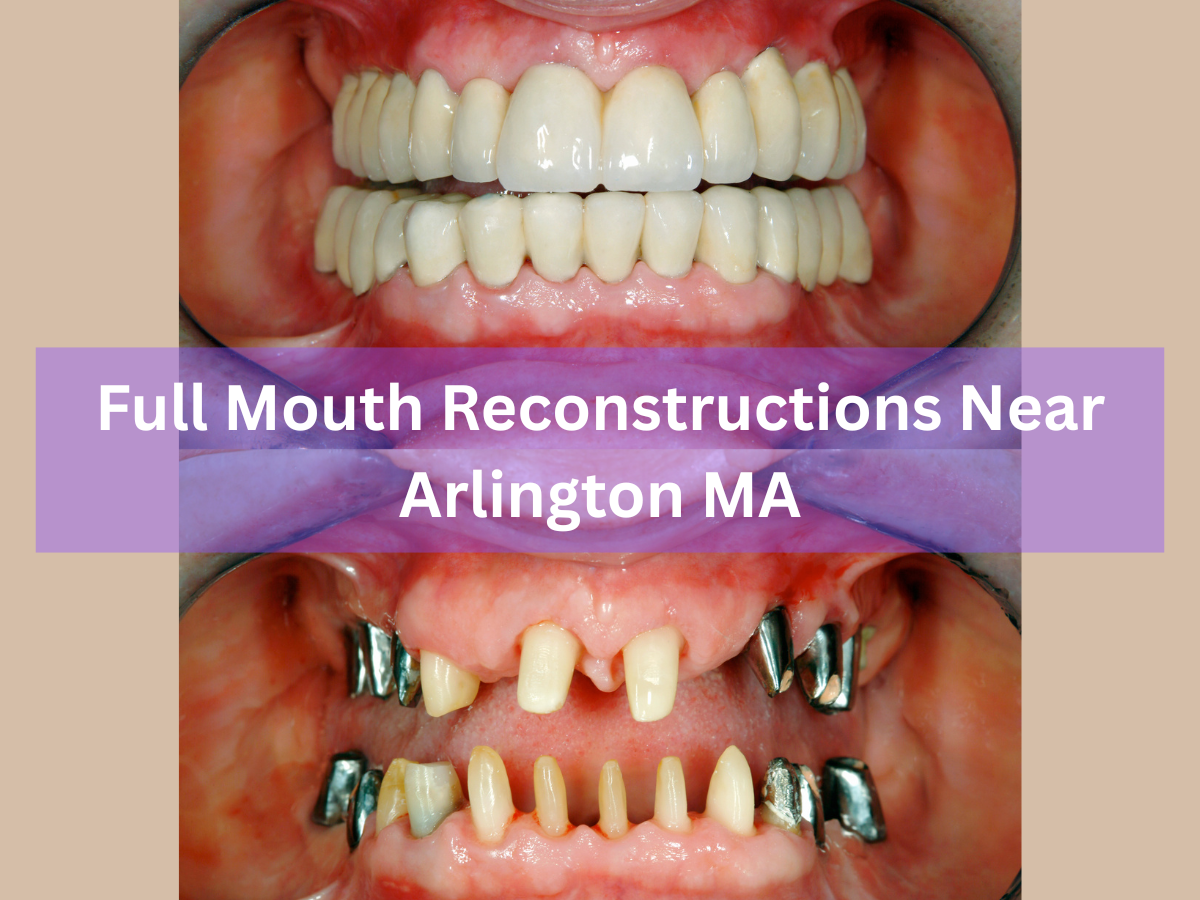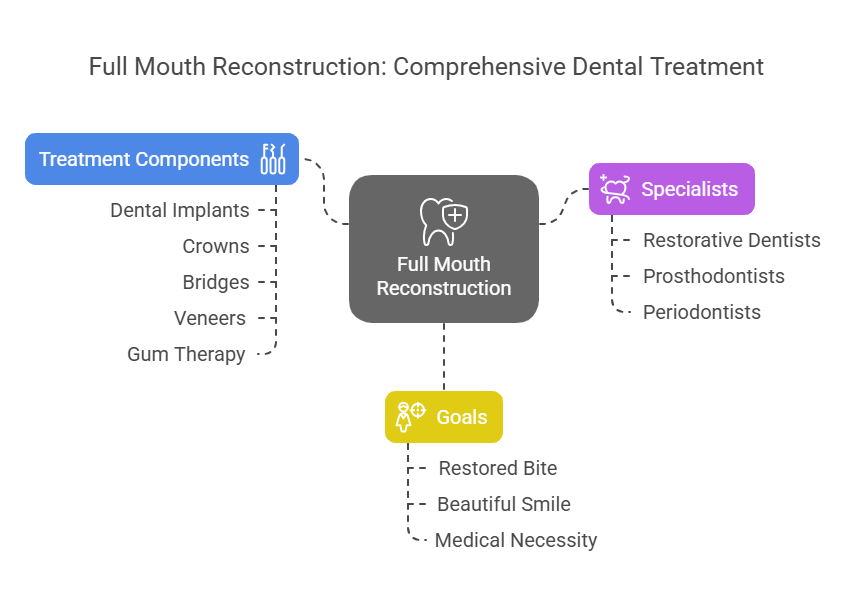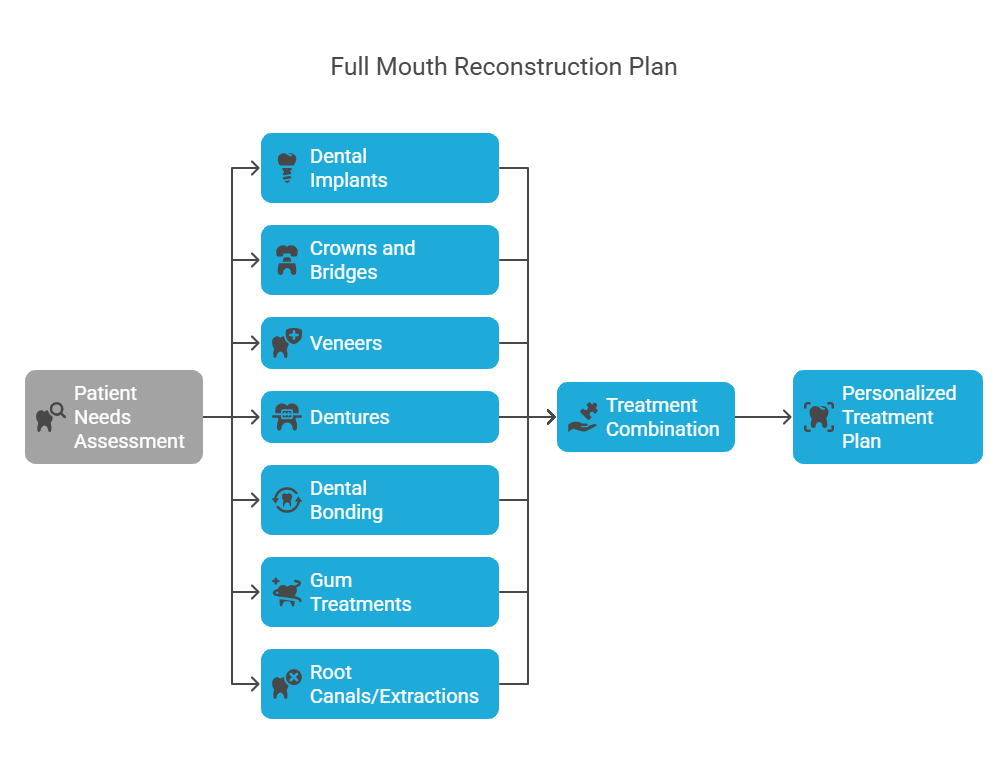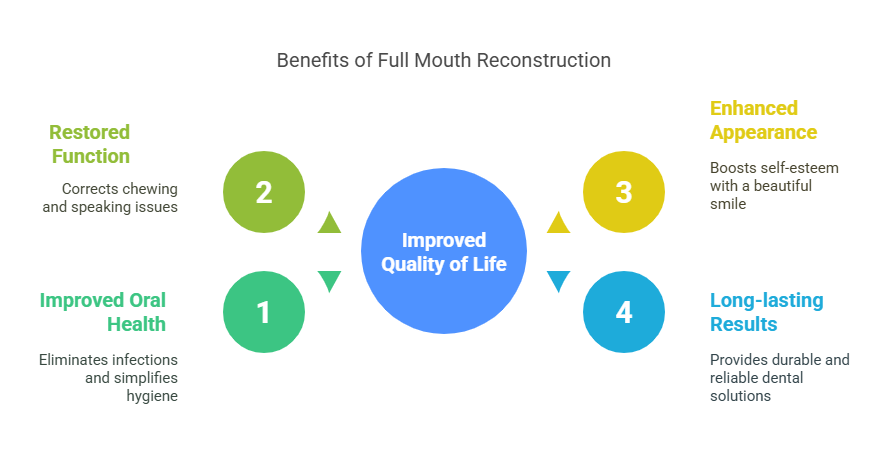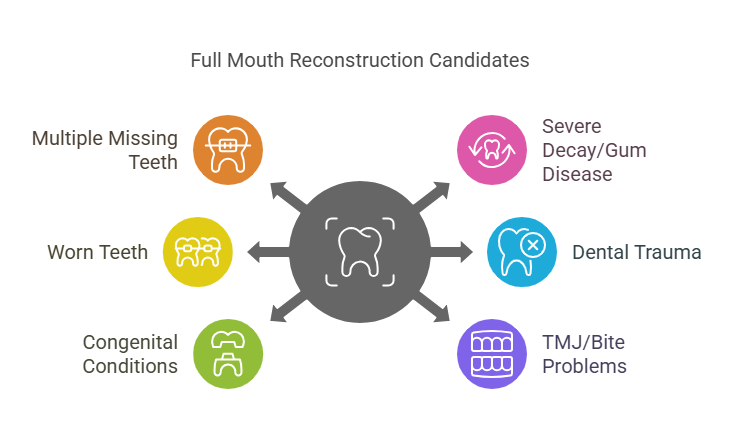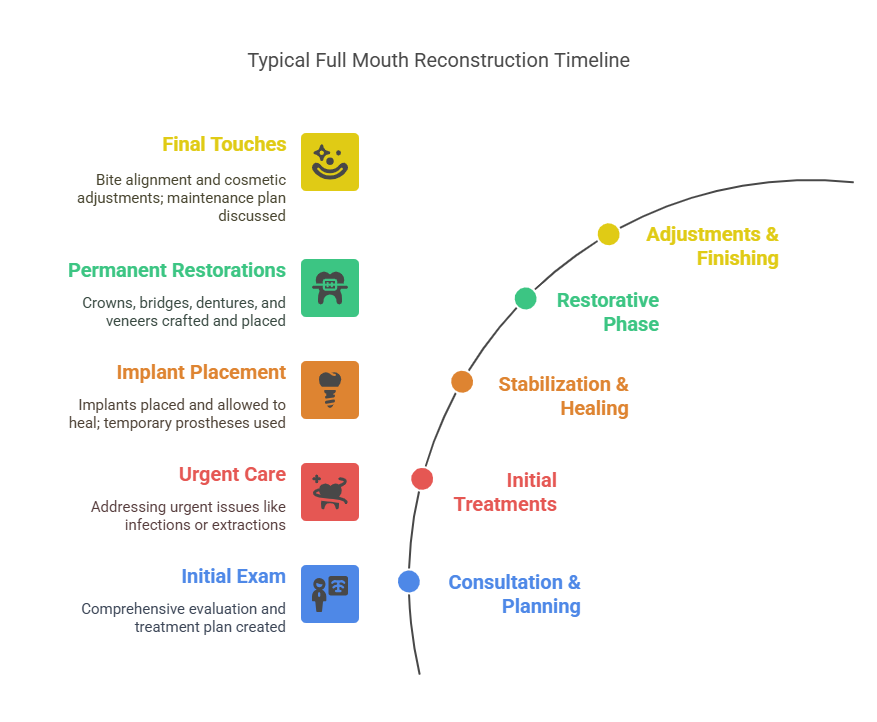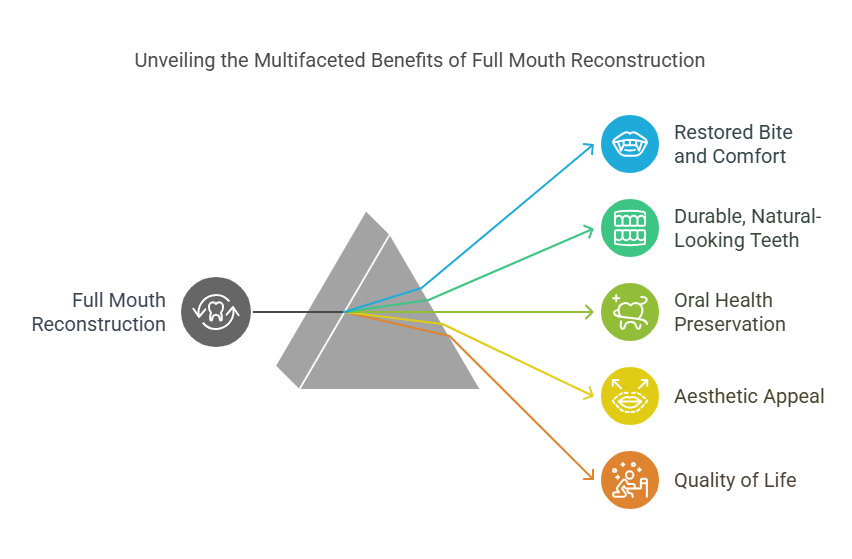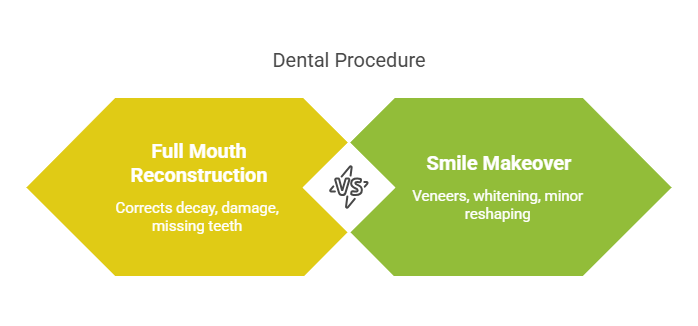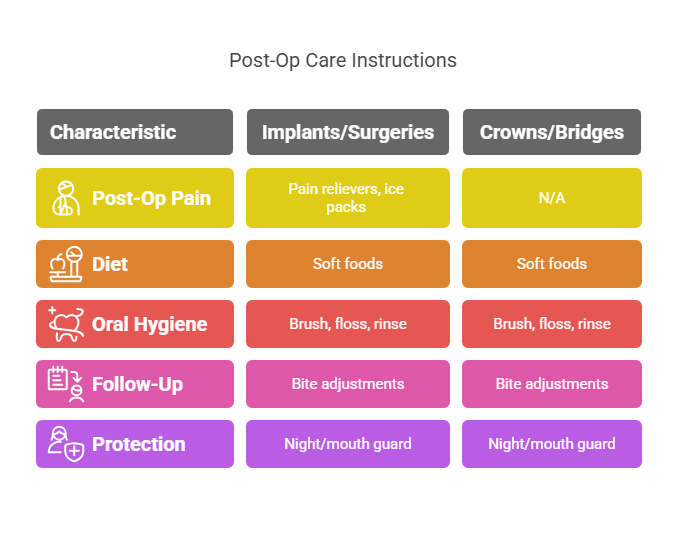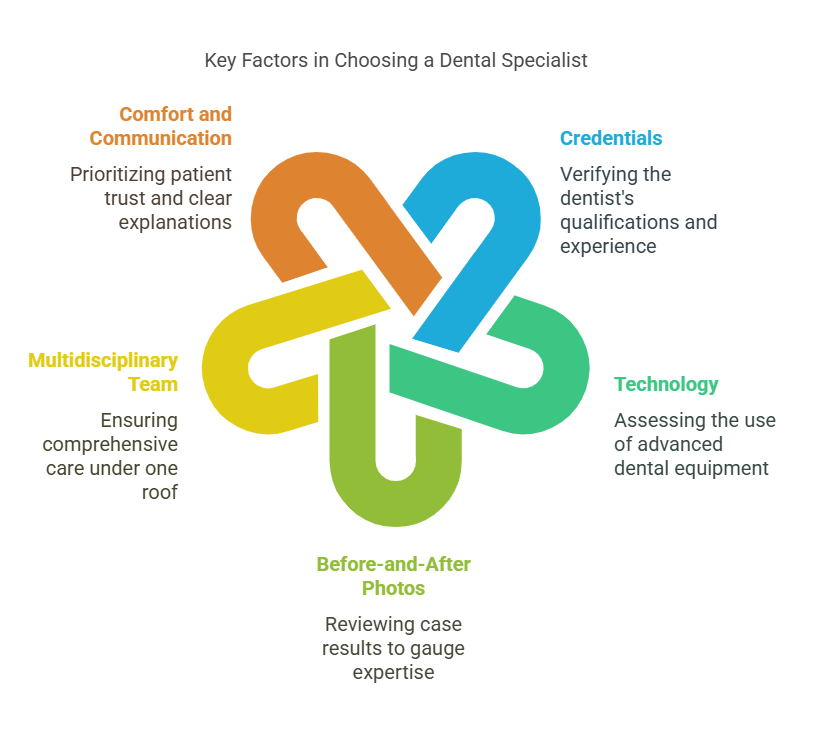If you’re living with multiple dental issues—such as broken, missing, or severely decayed teeth—you may be wondering if it’s possible to restore your smile and oral health all at once. In Arlington, MA, full mouth reconstruction offers a transformative solution for patients with complex dental needs. Whether due to trauma, disease, or years of wear, a comprehensive plan can rebuild your entire mouth for better function, appearance, and confidence. This guide explains what full mouth reconstruction is, who it’s for, what to expect, how much it costs, and why Arlington residents are turning to this life-changing dental service.
What Is Full Mouth Reconstruction?
Full mouth reconstruction (also called full mouth rehabilitation or full mouth restoration) is a comprehensive dental treatment that rebuilds or replaces most or all of a patient’s teeth. In Arlington, MA (as in any city), this is not a single procedure but a series of coordinated treatments. According to one local Arlington practice, full mouth reconstruction “can restore your smile if it has been severely injured, damaged, or decayed”. Essentially, when multiple teeth are compromised by decay, wear, trauma, or disease, a full mouth plan is designed to fix everything at once.
This differs from a routine filling or crown: FMR is an entire-mouth approach. It often involves multiple specialists (restorative dentists, prosthodontists, periodontists) working together. As Arlington Dental notes, FMR combines “multiple treatments (crowns, implants, veneers, etc.) to address serious oral health problems and give patients a healthy, attractive smile”. In practical terms, you might receive dental implants, crowns, bridges, veneers, and even gum therapy over several months to rebuild both function and aesthetics. The goal is a fully restored bite and beautiful smile, not just a quick cosmetic fix. Many patients confuse full reconstruction with elective cosmetic makeovers, but experts stress it’s usually medically necessary (due to decay or damage), not purely cosmetic.
Key Procedures in a Full Mouth Reconstruction
A full mouth reconstruction plan is custom-tailored to each patient’s needs. There is no one-size-fits-all procedure. However, commonly involved treatments include:
-
Dental Implants: Titanium posts implanted in the jaw to replace missing teeth or support bridges.
-
Crowns and Bridges: Custom caps (crowns) to strengthen broken teeth and bridges to span gaps of missing teeth.
-
Veneers: Thin porcelain shells bonded to the front of teeth to improve appearance or cover defects.
-
Dentures (Complete or Partial): Removable or fixed prostheses for multiple missing teeth or full-arch replacement.
-
Dental Bonding, Inlays/Onlays, Fillings: Restorative fillings or bonding materials to repair decay or small fractures.
-
Gum (Periodontal) Treatments: Scaling, root planing, or gum surgery to control advanced periodontal (gum) disease that affects teeth stability.
-
Root Canals or Extractions: Endodontic therapy to save badly infected teeth, or removals when teeth are beyond repair.
Each of these options may be part of your treatment. Arlington Dental’s page lists a similar range of services: “Dental bonding, bridges, fillings, implants, inlays/onlays, veneers, dentures (full or partial), periodontal treatment, root canal, or extraction”. The exact combination depends on your mouth. For example, a patient missing front teeth might get implants and crowns, plus veneers on worn teeth; another with severe decay might have multiple crowns and gum therapy. The dentist will thoroughly examine your teeth, gums, bite and plan all needed procedures.
Why Choose Full Mouth Reconstruction?
Full mouth reconstruction offers transformational benefits for patients who have extensive dental problems. Some of the key advantages include:
-
Improved Oral Health: By fixing or replacing all problem teeth, FMR eliminates sources of infection (decay, gum disease) and makes daily hygiene easier. A reconstructed mouth is much healthier.
-
Restored Function: Missing or damaged teeth make chewing difficult and can alter the bite. FMR restores proper chewing, speaking, and jaw function. This can alleviate chronic jaw pain or TMJ issues by correcting bite alignment.
-
Enhanced Appearance: As Dental Center notes, full-mouth rehab is often “life changing”: it not only stops infection and tooth loss but also boosts “self-esteem, self-image, [and] social confidence” through a beautiful smile. Arlington patients regain natural-looking, well-aligned teeth that look and feel normal. Many opt to include cosmetic improvements (whitening, veneers) along with functional fixes.
-
Quality of Life: With a healthy, complete smile, patients report eating whatever they want and smiling without embarrassment. As one Massachusetts dental group observed, after FMR patients can “smile confidently and eat what they like” because the repairs are “long-lasting and sturdy”. Improved speech and oral comfort also contribute to overall well-being.
In summary, full mouth reconstruction can turn a severely damaged mouth into a healthy, functional, and attractive one. Patients who struggled with broken, missing or painful teeth often say they feel years younger afterward. The procedure rebuilds both function and confidence, which can indeed be “nothing short of life-changing”. For more detailed information on the process and benefits of full mouth reconstruction, visit the American Prosthodontic Society’s full mouth reconstruction resource.
Who Needs Full Mouth Reconstruction?
Full mouth reconstruction is generally reserved for patients with advanced or widespread dental issues. It’s not a treatment for minor cavities – it’s for people who have multiple problems at once. Typical candidates include:
-
Multiple Missing or Damaged Teeth: If you’ve lost several teeth (front or back) or have many broken or heavily filled teeth, reconstruction may be needed to replace and protect them all.
-
Severe Decay or Gum Disease: Patients with chronic cavities, root infections, or advanced periodontitis affecting most of their teeth often require full rehabilitation once all minor fixes have failed.
-
Worn Teeth: Those whose teeth are severely worn down by grinding (bruxism) or acid erosion may need crowns and bite reconstruction.
-
Dental Trauma: Victims of accidents (sports injuries, falls, etc.) who have many fractured or knocked-out teeth often need comprehensive rebuilding.
-
Congenital Conditions: Rare genetic conditions like amelogenesis imperfecta or dentinogenesis imperfecta result in brittle enamel on most teeth, necessitating full-mouth treatment.
-
TMJ/Bite Problems: Chronic jaw pain, headaches, or malocclusion (misaligned bite) sometimes indicate underlying bite collapse that FMR can correct as part of the plan.
If you’re unsure whether you need full mouth reconstruction, start with a thorough exam. The dentist will check for all signs: cracks, root decay, loose or missing teeth, gum recession, bite alignment, etc. Arlington Dental explicitly lists examples: “chipped or broken teeth, cracked or fractured teeth, tooth decay, periodontal disease, one or more missing teeth, infection, [or] dental injury or trauma” as reasons you may benefit. If several of these apply, a full mouth plan should be considered.
The Full Mouth Reconstruction Process
A full mouth reconstruction is usually completed in phases over many months. The exact timeline varies by case complexity, but patients should expect a multi-step journey with several visits. Here is a typical outline of what to expect:
-
Comprehensive Consultation and Planning: First, the dentist or prosthodontist in Arlington will conduct a complete exam. This includes digital X‑rays, 3D imaging, bite analysis, and models or scans of your teeth. They may take photos or create wax-ups to preview treatment. This stage identifies every issue (cavities, infections, bone loss, bite problems) and forms a master plan.
-
Initial Treatments: Urgent problems are addressed next. This may involve deep cleanings for gum disease, root canals on badly infected teeth, or extractions of teeth that cannot be saved. The goal is to make the mouth healthy enough for reconstruction.
-
Stabilization and Healing: If implants are needed, titanium screws are placed in the jaw and then allowed to heal (osseointegrate) for 3–6 months. Bone grafts (if indicated) are done during this period. During healing, patients often use temporary prostheses (like partial dentures or flippers) so they are never without teeth.
-
Restorative Phase: Once the foundation is stable, permanent restorations are crafted and placed. This could be crowns on prepared teeth, bridges between implants, final dentures anchored to implants, veneers on remaining teeth, etc. The dentist will ensure each restoration fits well and looks natural.
-
Adjustments and Finishing: After all restorations are placed, the team will fine-tune bite alignment, and make any cosmetic tweaks (e.g., minor gum contouring). The final smile is polished, and a long-term maintenance plan is discussed.
Throughout these steps, the dentist will communicate the sequence of procedures. It’s common to have weekly or monthly appointments that span 6 months to a year. In general, the more surgery involved (like implants or bone grafts), the longer the overall timeline. Minor cases with mostly crowns and fillings can be done faster (a few months), whereas cases with implants or extensive orthodontics can take a year or more. Dental specialist notes, “A full reconstruction often takes several months to over a year from start to finish”.
Minimizing Discomfort
Modern dentistry makes full mouth reconstruction surprisingly comfortable. In-office local anesthesia (and sometimes sedation) is used for all invasive steps. Post-op soreness is managed with pain meds and ice. For most patients, the recovery pain is mild and temporary. According to expert, “full mouth reconstruction is typically not very painful” because dentists control pain during procedures. Any soreness usually subsides in a week or two, and patients can return to normal activities. Many Arlington dentists offer nitrous oxide or oral sedation for anxious patients, ensuring a stress-free experience. Good post-care (soft diet right after, gentle brushing) also speeds healing. In short, while any surgery has some discomfort, experienced prosthodontists keep patients comfortable. The reward — a fully functional, pain-free smile — is usually worth the brief recovery.
Benefits of Full Mouth Reconstruction
A successful full mouth reconstruction yields transformative benefits, both functional and emotional. Key advantages include:
-
Restored Bite and Comfort: With all teeth properly aligned and supported, patients regain the ability to chew and speak normally. Chronic jaw pain (TMJ) or bite-related headaches often improve significantly.
-
Durable, Natural-Looking Teeth: Modern materials (porcelain, zirconia) make crowns and implants look like real teeth. The reconstructed teeth are built to last decades with proper care. Patients can smile, laugh, and eat freely without worrying about broken or missing teeth.
-
Oral Health Preservation: Fixing all decay and replacing lost teeth protects jawbone and gum health. Implants in particular preserve bone height. The oral environment becomes healthier overall.
-
Aesthetic Appeal: The new smile is typically whiter, straighter, and more uniform. Patients can include cosmetic enhancements (like veneers or whitening) in the plan. As Dental explains, the cosmetic aspect of full-mouth rehab boosts self-esteem and confidence. Many patients feel years younger and more attractive.
-
Quality of Life: Removing painful or embarrassing dental issues lets patients enjoy a normal diet and social life. One Alabama clinic touts that after FMR “patients will be able to smile confidently and eat what they like” because the repairs are “long-lasting and sturdy”.
In sum, FMR does more than fix teeth — it often alleviates health problems and improves overall well-being. A completed reconstruction leaves the mouth in peak condition, and patients typically say it was worth the time and investment for the lasting change in their daily life.
Full Mouth Reconstruction vs. Smile Makeover
It’s important to distinguish full mouth reconstruction from a purely cosmetic “smile makeover.” A smile makeover generally refers to elective cosmetic procedures (veneers, whitening, minor reshaping) to improve appearance when oral health is already good. In contrast, a full mouth reconstruction is usually done out of medical necessity. As Arlington Dental clarifies, FMR is “usually medically necessary to correct extensive decay, damage or missing teeth,” whereas a smile makeover is elective. Of course, there is overlap: you can have cosmetic goals addressed during FMR (and many patients do), but the underlying driver of FMR is fixing health and function issues.
Think of it this way: restorative dentistry is the toolbox (fillings, crowns, implants), and full mouth reconstruction is using all the tools to rebuild the smile in one comprehensive plan. Smile makeovers might not involve implants or major bite changes; FMR often does. For Arlington patients, both are available, but the term “full mouth reconstruction” implies a full-scale rehabilitation, not just bleaching or veneer placement.
Cost and Insurance
One of the most common concerns is cost. A full mouth reconstruction is an extensive treatment, so costs can range widely. In the Arlington area, practitioners estimate that a full reconstruction could be “a few thousand to over $20,000 or more,” depending on complexity. For example, correcting a handful of teeth might run a few thousand, while replacing most teeth with implants could cost well into the tens of thousands. Dental implants are generally more expensive than fillings or crowns, so plans with multiple implants tend to be the costliest.
Insurance Coverage: Standard dental insurance often covers only a portion of basic procedures (like a percentage of fillings or crowns up to an annual limit). A full mouth reconstruction usually exceeds these limits, so many patients pay out-of-pocket or use financing. However, most practices will help file claims for whatever procedures are covered (e.g. partial payment for crowns or extractions). It’s wise to consult your provider about coverage for specific items. Many Arlington dentists also offer third-party financing or in-house payment plans to spread the cost.
In short: expect a personalized cost estimate after the initial consultation. Your dentist will outline each procedure’s cost and discuss payment options. Remember that this investment is spread over multiple visits and yields a lasting, complete smile – something many patients find invaluable.
Recovery and Aftercare
After finishing the reconstruction, there is still important aftercare to ensure longevity:
-
Follow Post-Op Instructions: Swelling or soreness after implants or surgeries is normal. Use prescribed pain relievers, ice packs, and any recommended mouth rinses. Rest as needed in the first days.
-
Dietary Precautions: Eat soft foods until healing is sufficient. Avoid very hard or sticky foods that could stress new restorations for the first week or two.
-
Oral Hygiene: Good brushing and flossing are critical. Even with implants and crowns, you must keep the gums and any natural teeth clean. Use anti-bacterial rinses if recommended.
-
Regular Check-ups: Attend all follow-up appointments to have bite adjustments or pressure-reliefs done on new crowns/bridges. Continue routine dental cleanings every 3–6 months as advised.
-
Protect Your Investment: If you grind your teeth, use a night guard to protect crowns. Wear a mouth guard for sports.
With proper care, full mouth reconstructions have high success rates. In fact, experienced prosthodontists report success rates well over 90% for full-mouth cases. The rare failures (e.g. an implant not integrating) can usually be remedied.
Choosing a Full Mouth Reconstruction Specialist in Arlington
Because of the complexity, it’s crucial to choose a highly qualified dentist. Full mouth reconstructions are often done by prosthodontists (specialists in restorative dentistry) or by general dentists with advanced training. Here are tips for Arlington patients:
-
Credentials: Look for dentists with “prosthodontics,” “restorative,” or “cosmetic reconstruction” prominently on their website. Verify their experience with large restorative cases.
-
Technology: Offices with digital X-rays, 3D imaging and in-house labs often plan and deliver reconstructions more precisely. Arlington Dental notes that clinics with “state-of-the-art technology and in-house labs” can make custom crowns and preview final smiles.
-
Before-and-After Photos: Many dentists display case photos. Ask to see before/after images of full mouth cases.
-
Multidisciplinary Team: Full mouth cases are easier when a practice has many specialists so that everything can be done under one roof. Dental Associates of Arlington highlights this: “From basic preventative care to complete dental reconstruction, we do it all” in-house. This means you won’t have to keep changing offices for different steps.
-
Comfort and Communication: FMR is a long process, so you want a team you trust. Look for patient testimonials (Arlington practices often share reviews). The right provider will explain each step clearly and make you comfortable.
In Arlington, reputable practices like Arlington Dental 43 Broadway (Dr. Robert Page) is experienced in complex restorations.
People Also Ask
What is full mouth reconstruction?
Full mouth reconstruction is a comprehensive dental process that rebuilds or replaces multiple teeth across both jaws. It combines procedures like crowns, bridges, implants, dentures, bonding, veneers, or gum treatments to restore the health, function, and appearance of a patient’s entire smile. It’s used when severe decay, damage, or tooth loss affects most of the mouth. Unlike a simple filling or single crown, FMR addresses virtually all dental issues in one coordinated plan.
Who needs full mouth reconstruction?
Patients who have widespread dental problems typically need FMR. This includes those with many missing, decayed, or broken teeth, advanced gum disease, severe bite issues, or significant wear from grinding. For example, someone with chipped, cracked, or absent teeth on both the upper and lower jaw might require a full mouth plan. Essentially, if multiple dental restorations are needed at once, FMR is likely recommended.
What procedures are included in full mouth reconstruction?
A full mouth reconstruction can include nearly any dental treatment, depending on the patient’s needs. Commonly it involves dental implants, bridges, crowns, inlays/onlays, veneers, dentures, root canals, periodontal therapy, or extractions. Each tooth is evaluated to decide whether to rebuild it (with a crown or filling) or replace it (with an implant or denture). The exact combination is customized per patient.
How long does a full mouth reconstruction take?
The timeline varies, but it usually takes several months to over a year from start to finish. Simple cases (crowns and fillings only) might finish in a few months, while complex cases with implants and bone grafts take longer. Implants require healing time (often 3–6 months before placing final crowns). Your dentist will give a detailed schedule based on your plan.
How much does full mouth reconstruction cost?
There is no fixed price, as each case is unique. In the Arlington, FMR can range from a few thousand dollars to over $20,000. The total depends on how many teeth are treated and which procedures are used. For example, replacing many teeth with implants costs more than just doing a few crowns. Most offices will provide an itemized estimate once they design your treatment plan.
Is full mouth reconstruction covered by insurance?
It depends on your insurance. Typically, standard dental plans cover only portions of basic procedures (like 50% of a crown) up to an annual limit. A full reconstruction usually exceeds these limits. Dentists will usually file claims for each covered procedure (crowns, fillings, etc.), but you should be prepared to pay most costs out-of-pocket. Many patients use payment plans or financing. It’s best to check your plan and discuss options with the dental office.
How painful is recovery from full mouth reconstruction?
Thanks to modern techniques, recovery is generally not too painful. Dentists use anesthesia and sedation during treatments, so you feel little or nothing during the procedures. Afterwards, you may have soreness for a few days, especially after extractions or implants. However, these are usually managed easily with over-the-counter or prescribed painkillers. Most patients report only mild discomfort that resolves in about a week.
What are the benefits of full mouth reconstruction?
The main benefits are restoring a fully functional, healthy smile and boosting confidence. After FMR, patients can chew normally, speak clearly, and enjoy their favorite foods without worry. It also prevents further dental problems and improves oral hygiene. A great looking smile often comes too – as one practice puts it, the health and social benefits are “nothing short of life changing,” increasing self-esteem and confidence.
Can FMR fix a bad bite or TMJ problems?
Yes. Part of many full mouth plans is correcting the bite. If malocclusion (misalignment) or TMJ issues are present, the dentist will design restorations (crowns or implants) that improve how the teeth meet. Rebuilding tooth height and position can relieve jaw strain and reduce headaches. Athletes or patients with grinding damage often see big improvements after FMR.
Where can I get full mouth reconstruction in Arlington, MA?
Several Arlington-area dentists and specialists offer full mouth reconstruction. Local practices like Arlington Dental (43 Broadway) and Dental Associates of Arlington in Arlington Center have expertise in complex cases. Some patients also travel for specialists. Look for dentists who highlight “full mouth reconstruction,” “prosthodontics,” or “complex restorative cases” on their websites. A good sign is a dentist who showcases before/after photos and offers comprehensive consultations. Arlington Dental encourages anyone who feels they need a reconstruction to call and schedule a consultation.
Frequently Asked Questions
What is included in a full mouth reconstruction?
It can include any combination of dental treatments needed to rebuild the mouth. Typical components are dental implants, crowns/bridges, veneers, dentures, fillings, root canals, and gum therapy. Essentially, any procedure needed to restore every tooth and gum structure can be part of the plan.
Who is a good candidate for full mouth reconstruction?
Anyone with extensive dental damage across the mouth. This includes patients with multiple missing or decayed teeth, severe gum disease, jaw pain related to bite, or significant wear from grinding. The dentist will evaluate your oral health and suggest FMR if it’s the best way to restore your smile.
How long will the treatment take?
On average, FMR requires several months to over a year. Timelines depend on your treatment plan. Cases with implants or bone grafts take longer due to healing time. Simpler cases with only crowns and fillings take less time. Your dentist will outline the schedule after the initial exam.
Is full mouth reconstruction painful?
Most patients experience minimal pain. Dentists numb the area and use sedation if needed, so the work itself is painless. After treatment, some soreness or swelling is normal (especially after surgeries), but it can be controlled with pain relievers. Any discomfort usually subsides within a week or two.
How much does it cost?
The cost varies widely. In the Arlington area, full mouth reconstruction can range from a few thousand to $20,000+. The final price depends on how many teeth and what treatments you need. Always get an itemized estimate before proceeding.
Does insurance cover it?
Coverage depends on your plan. Typically, insurance pays only for individual procedures (like a portion of crown costs) and has an annual maximum. A full reconstruction often exceeds those limits. Dentists will bill your insurance for covered parts, but most of the bill may be out-of-pocket. Many offices offer financing.
Can full mouth reconstruction fix my bite?
Yes. Correcting the bite (occlusion) is often a key goal of reconstruction. By rebuilding or repositioning teeth with crowns, bridges or implants, dentists can improve jaw alignment, which may relieve TMJ symptoms or uneven wear.
What are alternatives to full mouth reconstruction?
If only part of the mouth needs work, a partial reconstruction might be done instead (just the upper or lower jaw). Smile makeovers (veneers/whitening) are alternatives for mostly cosmetic cases. Dentures or “all-on-4” implant bridges can replace all teeth on an arch without treating each tooth individually. The best alternative depends on your specific issues and budget.
What is the success rate of full mouth reconstruction?
Very high when performed by experienced professionals. Studies and specialist reports show success rates above 90% for full-mouth cases. Proper planning and oral hygiene keep complications rare.
How do I choose a dentist for this?
Look for a prosthodontist or a general dentist with extensive restorative experience. Check online reviews and before/after galleries. Ask if they have advanced technology (3D imaging) and if they handle the entire process in-office. A good dentist will thoroughly explain your options and create a detailed treatment plan.
Conclusion
A full mouth reconstruction is more than just a series of dental procedures—it’s an investment in your health, confidence, and quality of life. For Arlington, MA residents dealing with widespread dental damage, this comprehensive treatment plan offers a chance to reclaim the comfort, appearance, and function of a healthy mouth. With advanced technology, compassionate care, and experienced specialists, local practices are making it easier than ever to restore your smile.
If you think you might be a candidate, schedule a consultation with a trusted full mouth reconstruction dentist in Arlington to take the first step toward a better you. Searching “dentist near me” in Arlington, MA? We’re at Arlington Dental, 43 Broadway, Arlington, MA 02474. (781) 641-0500.


